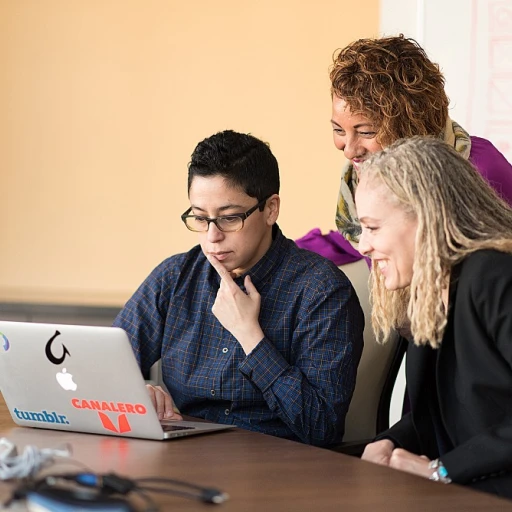
Understanding Pre-Employment Screening
Demystifying the Initial Screening Process
Embarking on the journey towards securing a new job can be both exciting and daunting. One of the first steps candidates encounter is the pre-employment screening process. This phase is crucial as it sets the foundation for the rest of the hiring experience. Understanding what this entails can significantly ease any anxiety and help you present your best self.
Pre-employment screening typically involves a series of checks and evaluations that employers use to verify your qualifications and ensure a good fit for the role. This can include background checks, reference verifications, and sometimes more specialized assessments depending on the industry.
While it might seem like a mere formality, this stage is a vital part of the hiring process. It ensures that both the employer and the candidate are aligned in terms of expectations and requirements. As you move forward, you will encounter various assessments, such as personality and cognitive ability tests, which are designed to gauge your suitability for the role beyond just your resume.
Understanding the importance of these screenings and what they entail can help you prepare adequately. As you progress to the interview process, having a clear understanding of the initial screening can provide you with the confidence needed to navigate subsequent stages effectively.
The Role of Personality and Cognitive Ability Tests
The Impact of Personality and Cognitive Tests on Hiring Decisions
In the journey towards securing your next professional opportunity, understanding the many facets of the pre-employment landscape is crucial. Personality and cognitive ability tests have become significant tools in the hand of employers looking to refine their candidate selection process. These assessments offer insights into your unique traits, how you perceive challenges, and your potential adaptability to various organizational cultural settings. While these assessments might feel like just another hoop to jump through, they actually serve a dual purpose. For employers, they provide an understanding of how a candidate might fit within a team, potentially predicting future job performance and satisfaction levels. For candidates, these tests can be illuminating, offering a mirror into aspects of your personality that may not be immediately apparent and underscoring areas for personal and professional development. However, it's essential to approach these tests with integrity and authenticity. Attempting to game the system is not only counterproductive but also often futile, as these assessments are designed to detect inconsistencies and patterns that may indicate insincerity. In our ongoing exploration, we will delve into the interview process, a critical juncture in the employment pathway, and how it aligns with the insights gained from these tests.Navigating the Interview Process
Mastering Your Interview Strategy
The pre-employment journey is a pivotal period for candidates and employers alike. One of the most crucial steps in this journey is the interview process, which serves as a bridge between evaluating candidates' potential and envisioning them as part of the team. Preparing for an interview goes beyond simply dressing the part and memorizing answers to common questions; it’s about setting yourself apart and demonstrating your potential value to the organization. A strategic approach to interviews starts with understanding the company's culture and aligning yourself with their values. Research the organization thoroughly—a task which echoes the insights shared in parts 1 and 2 of this series regarding the importance of preparation. Identify key characteristics of the company’s environment and think about how your experience and personality might complement this framework. Next, focus on personal branding. You'll need to succinctly communicate who you are, your professional journey, and what you bring to the table. This narrative becomes compelling when supported by tangible achievements and examples. For instance, if the skills tests mentioned in the adjacent chapter have demonstrated your ability to facilitate positive change, use specific anecdotes to illustrate these claims during the interview. Of course, interviews are a two-way street. While the employers assess your fit, it's also your opportunity to determine if the company meets your career aspirations and values. Prepare thoughtful questions that can provide insight into the team's dynamics, management style, and expectations. These queries not only reflect your genuine interest in the role but also help you gauge whether the company is aligned with your professional objectives. Another key aspect of navigating interviews is adaptability. Be ready to handle different formats—whether it's a causal chat or a technical grilling. Each style presents unique challenges and opportunities to shine. Moreover, remember that interviews often involve multiple stages. Whether you’re engaging in preliminary phone screenings or final face-to-face meetings, maintain consistency in your message and attitude. Lastly, don't underestimate the power of follow-up. A well-crafted thank you note can reinforce your enthusiasm and reiterate key points from your discussion. It’s a subtle yet effective way to stay top-of-mind with hiring managers. To further enhance your post-interview transition, consider integrating onboarding insights. As shared in the article on making onboarding a key part of the hiring experience, the transition from candidate to new hire is smoother with clear expectations and engaged communication. Navigating the interview process may seem daunting, but with preparation, insight, and effective strategy, it can become a definitive step toward securing your desired role.The Importance of Skills Tests
Evaluating Practical Skills for Job Success
In today's competitive job market, ensuring that candidates possess the necessary skills to excel in their roles is crucial. Skills tests have become an integral part of the pre-employment journey, providing employers with a reliable way to assess a candidate's capabilities in real-world scenarios.
Skills tests are designed to evaluate a candidate's proficiency in specific areas relevant to the job. These assessments can range from technical skills, such as coding or data analysis, to soft skills like communication and problem-solving. By simulating job-related tasks, employers can gain a clearer understanding of how a candidate might perform in the actual role.
While personality and cognitive ability tests, discussed earlier, offer insights into a candidate's potential fit within a company culture and their general problem-solving abilities, skills tests provide concrete evidence of their practical knowledge and expertise. This combination of assessments helps create a comprehensive profile of each candidate, allowing for more informed hiring decisions.
Moreover, skills tests can enhance the candidate experience by offering them an opportunity to demonstrate their abilities beyond the traditional interview setting. Candidates often appreciate the chance to showcase their skills in a context that closely resembles the work environment they are applying to join.
Employers should ensure that skills tests are relevant, fair, and aligned with the job requirements. This approach not only helps in identifying the best candidates but also promotes a positive candidate experience, which is vital in attracting top talent. By integrating skills tests into the pre-employment process, companies can make more strategic hiring decisions that benefit both the organization and the candidates.
Ensuring a Great Candidate Experience
Crafting a Positive Candidate Journey
In the competitive landscape of talent acquisition, ensuring a seamless and engaging candidate experience is more crucial than ever. A well-designed pre-employment journey not only attracts top talent but also sets the tone for future employee engagement and retention. From the moment a candidate applies, every touchpoint should be crafted with care and precision.
The pre-employment phase is a candidate's first real interaction with your company culture. It is essential to communicate clearly and consistently, providing timely updates and feedback. This transparency helps build trust and keeps candidates engaged throughout the process.
Personalization is another key factor. Tailoring communication and interactions to the individual candidate can make them feel valued and respected. This can include personalized emails, addressing specific concerns during interviews, or providing customized feedback after assessments.
Technology plays a significant role in enhancing the candidate experience. Leveraging applicant tracking systems, automated communication tools, and virtual interview platforms can streamline the process and make it more efficient for both the candidate and the hiring team. However, it's crucial to balance automation with a human touch to ensure candidates don't feel like just another number.
Moreover, feedback is a two-way street. Encouraging candidates to share their thoughts on the process can provide valuable insights into potential improvements. This not only shows that you value their input but also helps refine the pre-employment journey for future candidates.
As you navigate the intricacies of pre-employment assessments, from personality tests to skills evaluations, remember that the ultimate goal is to create a positive and memorable experience for every candidate. This not only enhances your employer brand but also increases the likelihood of attracting and retaining the best talent.
Legal Considerations in Pre-Employment Assessments
Legal Frameworks and Compliance
In the pre-employment journey, understanding the legal landscape is crucial for both employers and candidates. Navigating this terrain ensures that the hiring process is fair, transparent, and free from discrimination. Employers must adhere to various laws and regulations that govern hiring practices, such as equal employment opportunity laws, data protection regulations, and anti-discrimination statutes.
One key aspect is the handling of personal data collected during pre-employment screening. Employers need to ensure that they comply with data protection laws, such as the General Data Protection Regulation (GDPR) in Europe or the California Consumer Privacy Act (CCPA) in the United States. These regulations mandate that candidates' personal information is collected, stored, and processed with their consent and for legitimate purposes only.
Additionally, when conducting personality and cognitive ability tests, it's essential to ensure that these assessments do not inadvertently discriminate against any group. Employers should regularly review and validate their testing processes to maintain fairness and compliance with legal standards.
Moreover, during the interview process, employers must be cautious about the questions they ask. Questions should be relevant to the job and should not delve into personal areas that are protected by law, such as age, marital status, or religious beliefs.
Finally, skills tests should be designed to assess candidates' abilities without bias. Employers need to provide reasonable accommodations for candidates with disabilities to ensure an equitable assessment process.
By staying informed and compliant with legal requirements, employers can foster a positive and inclusive pre-employment experience, paving the way for a successful hiring process.



